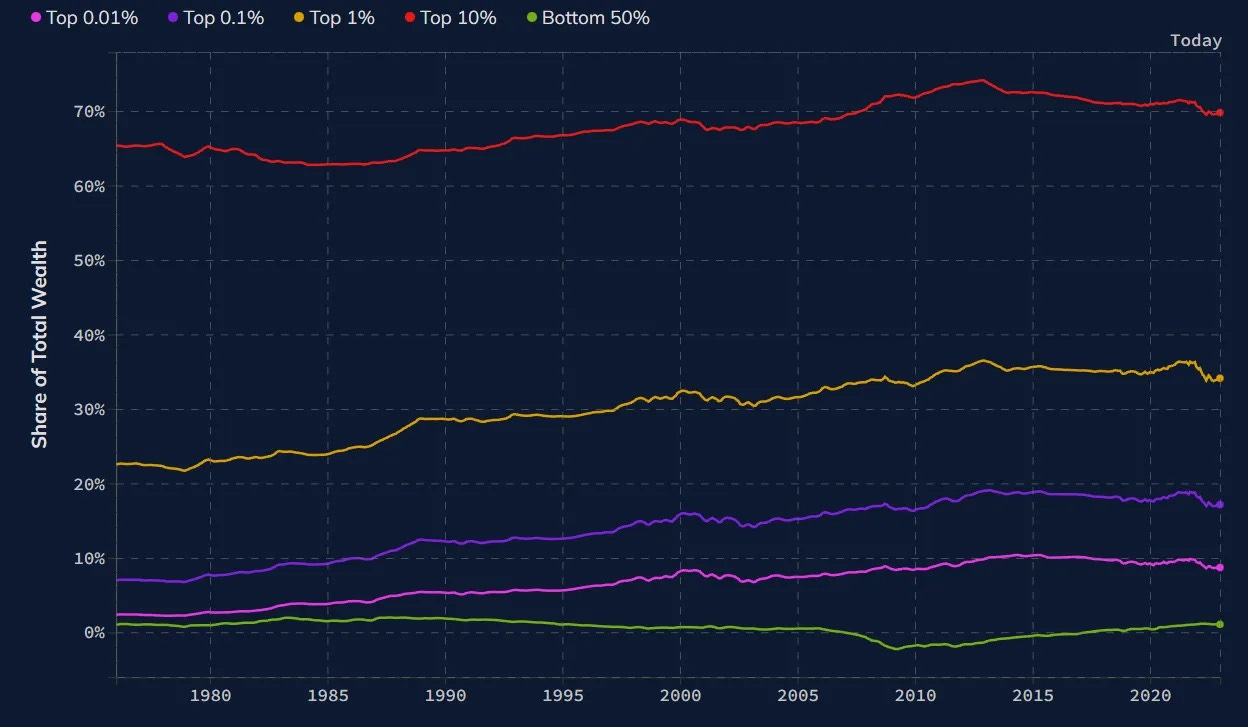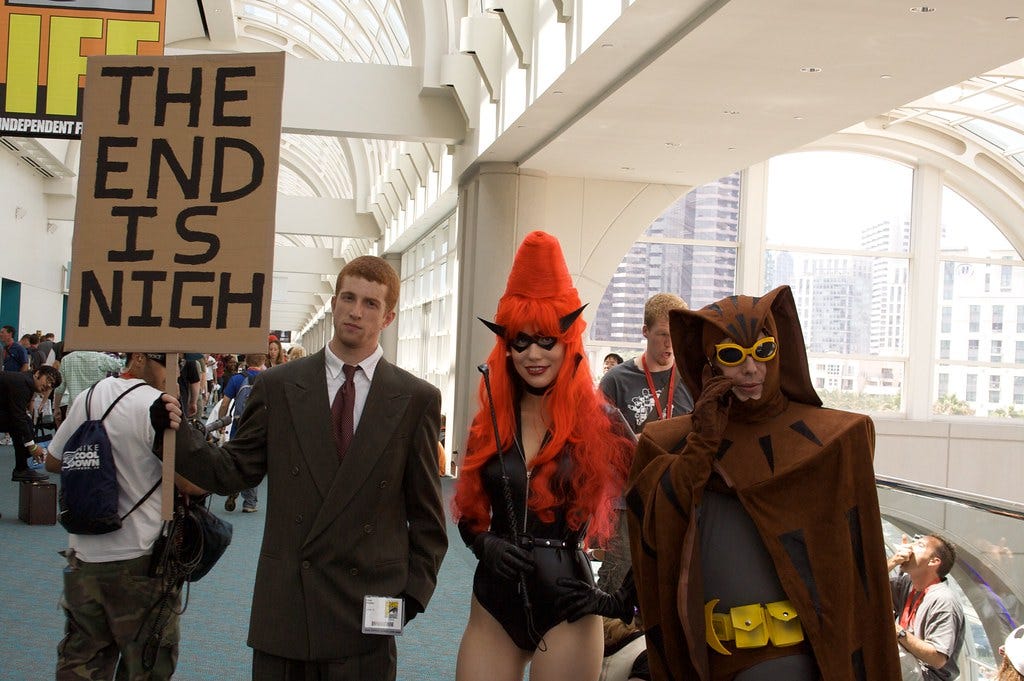For a while now, the media has been debating the cause of a wave of teenage unhappiness in the U.S. The other day, the Washington Post writer Taylor Lorenz posted a series of tweets in which she argued the main reason teens are unhappy is simply that they realize the world around them is a “hellscape”:
In fact, Lorenz is far from the only one uttering such pronouncements — there’s an entire “doomer” subculture out there on the internet. To see some more examples, check out the substack “OK Doomer”, with lovely post titles like “We're Living through The End of Civilization, and We Should Be Acting Like It” and “You're Not a Fearmonger. You Have Sentinel Intelligence.” Most of the prophecies of doom center around Covid (which some doomers insist is a disease akin to HIV, whose true damage will manifest only later), climate change, environmental destruction, and — inevitably — capitalism. Meanwhile, doomer culture is debated in the pages of the New York Times and the BBC. It even has its own music.
Now, as someone who has struggled with clinical depression for two decades, I’ll be the last person to tell the good people of the world to buck up, turn that frown around, and realize that everything is going to be OK. Because in a deep sense, it’s not going to be OK — we’re all going to die, and almost all of us are going to do so without accomplishing at least some of the stuff we wanted to. Many grievous injustices will go unpunished, many terrible things will happen to good people, and many empires will strike back without Jedi ever returning. You’re probably a worse driver than you think you are. The sun will grow and swallow the Earth, the stars will wink out, and the Universe will inexorably decay into meaningless noise.
That’s the bad news. The good news is that in the time remaining to us, we get to pet some fluffy bunnies!
But OK. Let’s forget about the heat death of the Universe for a moment (which in my experience is the only good way to deal with it), and talk about the specific stuff that the doomers are dooming about. Most of it is just not nearly as bad as they say. Many Twitter users rushed to point out all the flaws in Lorenz’ claims, but here’s a quick run-through anyway.
The default dooms aren’t so dire
First, let’s talk about “late capitalism”. This term is a holdover from the days when lots of people really believed in a Marxist version of historical destiny, in which capitalism would ultimately destroy itself from its own contradictions and socialism would inevitably succeed it. Yet somehow capitalism just keeps getting later and later, and the prophesied self-destruction keeps not happening.
In fact, quite the opposite. Even as capitalism has conquered the world, humanity is richer now than it has ever been, and for the last three decades income growth has been concentrated in low-income countries. Poverty is down at every level, not just in rates but in absolute numbers:
And of course the bad things that go along with poverty are down as well — child mortality, illiteracy, hunger, and so on.
A fair amount of this growth was due to free-market reforms in China, India, and other countries. But general human flourishing isn’t purely due to capitalism — inequality has been restrained by steadily growing government redistribution.
This is true in Latin America and many other developing countries as well. It isn’t pure free-market dog-eat-dog capitalism that’s triumphant — it’s a mixed economy with a strong social safety net.
How about the U.S., birthplace of Reaganomics and bastion of capitalist callousness? Lorenz’ allegation that we have “record wealth inequality” is a little out of date; the wealth shares of the top percentiles have decreased a bit over the last decade.

Wage inequality is down a bit as well, with wages rising strongly for low earners since the mid-2010s. This is at least partly a result of the fact that practically everyone who wants a job in the U.S. has a job.
Lorenz is extremely wrong when she claims that the U.S. has “0 social safety net”. As you can see from the chart above, U.S. public social spending has risen steadily as a share of GDP. We have Social Security, SSDI, Medicare, Medicaid, unemployment insurance, Section 8 housing vouchers, SNAP, the EITC, the child tax credit, and many other safety net programs. This safety net does leave much to be desired — I would much prefer that this thicket of targeted benefits be simplified by giving people cash, and that onerous and usually pointless work requirements be repealed. But to claim that the U.S. has no social safety net is to promulgate fantasy. And this safety net has real and amazingly positive effects:


As for job security, most workers in the private sector aren’t unionized, but the average tenure of employment has stayed the same since the 1990s. Except for a spike during the pandemic, the layoff rate has fallen slowly but steadily since the turn of the century.
OK, so let’s talk about that pandemic. Covid is a major focus for the doomers, but a growing number of people (including President Biden) say that the pandemic is over, and Covid has fallen far behind other issues in terms of Americans’ priorities. Meanwhile, despite a steady drumbeat of new variants, Covid deaths in the West are stable, with nothing like the big waves of the first two years:
This is due in part to the amazing efforts of human science, which developed safe and effective vaccines in record time. Those vaccines are now reckoned to have saved millions of lives in the U.S. alone, and tens of millions worldwide.
Doomers, of course, have their own set of fringe Covid-related beliefs. Some claim that Covid is an HIV-like disease whose true damage to the human body doesn’t become apparent for a long time. But I follow a number of Covid experts, and as far as I can tell there is no evidence of this, or of any of the doomers’ extravagant claims about the disease.
And finally, let’s talk about climate change. This is a real threat to the world, and one that we haven’t dealt with yet. But there are a number of reasons to think that the doomer case is overdone.
For one thing, recent climate models have all but ruled out most of the worst-case scenarios for warming. Although it’ll be very difficult to hold warming below the 1.5 degrees generally considered “safe”, there’s now a good chance that we can hold warming below the 2 degree level, which is around the point where words like “catastrophic” start to make sense:

Also, estimates of emissions during the 2010s have now been revised downward, and emissions are now growing only slowly:

Many forecasters now expect the peak of annual global emissions to occur in the next couple of years.
And meanwhile, our institutions of science, industry, and government have now all been alerted to the danger, and are pouring increasing resources into the green energy transition:


In other words, climate change is definitely going to be a bumpy ride for the planet, and it’s not yet certain that we’ll defeat it in time to save ourselves from major harm. But recent progress is extremely encouraging.
In other words, none of the standard threats that the doomers wring their hands and wail about is as dire as they would have us believe.
Doomerism is a demotivating DDoS
But, you may ask, why do I point this out? In fact, I’m not trying to cheer anyone up, least of all the doomers themselves. What I really want is for people to refocus on the problems that matter most, and to stay motivated to fight those problems.
I cannot give you any set of facts or statistics or charts that tells you whether you should be optimistic or pessimistic about the world; that is a matter of opinion. But what data can do is to make you better able to calculate the relative importance of the various threats, risks, and trends in the world.
The reason that we shouldn’t exaggerate the threats from the aforementioned set of standard Millennial boogeymen is that there are other things we need to worry about. Capitalism isn’t failing, but U.S. healthcare and infrastructure and housing and college education cost twice as much as in other developed countries. Covid isn’t the new HIV, but U.S. life expectancy has fallen thanks in part to opiates, alcoholism, suicide, and endemic violence. Climate change isn’t going to destroy human civilization in the next few years, but a world war might.
Of course, doomers could easily just add all these things to their list of worries. But that doesn’t help. What doomerism does, basically, is to execute a distributed denial-of-service attack on our threat perception. If we start to see everything in the world as a mortal threat, it makes us incapable of focusing our efforts on the actual priorities. I see doomerism as an extreme version of “polycrisis” thinking — the tendency to see all the bad stuff in the news as part of a mutually reinforcing web, instead of a list of challenges to be addressed one by one.
Doomerism also reduces motivation to actually solve problems. First of all, if you think the world is headed for certain doom, it doesn’t make sense to expend effort to try to fix things. You might as well just give up, and that’s exactly what doomers demonstrably do.
But on top of that, the constant negative thoughts and catastrophizing that doomers engage in represents a sort of continuous psychological self-punishment that can only have negative effects on mental health in the long run. It’s generally accepted among psychologists that punishment works only as a short-term motivator; if you keep punishing someone over the long term, they just develop mental and emotional problems. Doomers are basically doing this to themselves.
Some people who disagree with the doomers’ pronouncements nevertheless think that their ideas should be politely humored, as a kindness toward people whom they perceive as having mental health issues. But having been through many years of therapy, I can assure you that playing along with dark fantasies is not good for people. The “cognitive” part of cognitive behavioral therapy — currently the most effective kind of psychotherapy we have — focuses on eliminating unrealistic, intrusive negative thoughts.
Now that doesn’t mean Twitter is a good forum for trying to push doomers back toward reality — it’s an extremely poor substitute for psychotherapy. But I think it does mean that we should actively combat doomer ideas in the world at large, to save people from entering the doom loop in the first place.
More broadly, I worry about a culture of negativity on the political Left — and yes, that includes the center-left of which I count myself a part. Acknowledging any amount of progress on any problem is often seen as encouraging complacency. But failing to acknowledge any progress eventually backfires, turning into helpless doomerism — if nothing ever gets better, why try?
Instead, doomerism is a psychological tendency that must be constantly and actively resisted. And in the modern day, that’s no easy task. Plenty of research shows that negative news is more attention-grabbing than positive news. And with the advent of social media, it’s not just click-hungry media outlets bombarding you with negative news — it’s every clout-chasing 2000-follower account hoping for their big break. There’s always plenty of bad stuff going on in the world, but now there are literally millions of people with an incentive to find every bit of that bad stuff and shove it directly into your face, hoping you’ll reward them with a retweet or a follow.
In other words, maybe it is the phones after all.
So how do we resist that siren call? One obvious move is to follow Taylor Lorenz’ own advice, and get off of social media a little more — as the kids say, go touch grass. Go hang out with some real human beings, in person. Another good move is to listen to Billy Joel’s “We Didn’t Start the Fire”, and read a lot of Wikipedia, and remember that the world has never had a shortage of dire threats and existential risks and looming problems. Humanity made it through millennia of starvation and dire poverty, we made it through the Black Death and smallpox and Spanish Flu and the Mongol conquests and the World Wars and any number of economic depressions and the thread of Cold War nuclear annihilation. We’ve probably got a good shot at making it through the next thing, too.
And of course, if all else fails, call up your local rabbit rescue and go pet some fluffy bunnies. It works for me!










Fantastic piece. Thank you.
One point I would like to add is that we do harm when our response to risks is excessive.
My favourite example is fear of radioactivity from nuclear power plants and their waste. Our regulatory regime treats a life lost to exposure to radioactivity from nuclear energy and its waste as being 100 to 10,000 times more valuable than a life lost to air pollution from burning fossil fuels and biofuels. Because of this we made nuclear power so expensive and unpopular in the 1980's that we stopped building new reactors, and instead built fossil fuel (mainly coal) powered reactors. This has resulted in many millions of avoidable deaths every year and has dramatically accelerated climate change. Despite the fact that nuclear energy, including the older reactors built under the previous regulatory regimes, have turned out to be the safest form of reliable energy, those regulations have never been made more rational. We could decarbonise much faster and have much cheaper electricity if we make regulations more reasonable. Fear stops us.
We are now treating anthropogenic climate change as being such a serious risk that we are seriously considering policies which will kill millions of people, by increasing energy poverty and slowing economic growth in low and middle income countries. This is nuts as the current projections indicate a minimal if any increase in mortality from warming. While more will die from extreme heat, fewer will die from extreme cold - which currently kills far more people than extreme heat, especially in low and middle income countries. In the past 20 years warming in the UK has resulted in 500,000 fewer deaths!
I wouldn't even call it a subculture. It's as if hopelessness has infiltrated all our minds. Hopelessness is our worst enemy. If an enemy can make you believe you have already lost, then this becomes a self-fulfilling prophecy.
The theme of hopelessness, of resistance being futile (unless equipped with superpowers) is a very common theme in popular culture. We are being played.